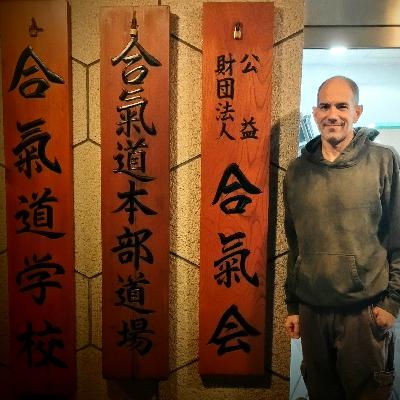Aikido: Our stories
Description
On this special edition of Ki to the City, we present a unique “swapcast” featuring an insightful conversation with a dedicated Aikidoka, Jeannys Nnembeng, who is driving a critical new initiative to ensure the future health and inclusivity of Aikido.
Jeannys, a fellow member of Bond Street Dojo and Aikido Schools of Ueshiba (ASU), joins us to discuss her journey and this major project she is leading.
(We structured this conversation as a “swapcast”—first, I interviewed Jeannys for Ki to the City; then, we switched roles to record my story for her exciting new initiative)
Jeannys is heading a vital social engagement project for ASU, focused on promoting inclusion and diversity across the Aikido community. This project, titled “Aikido: Your Story,” aims to attract the next generation of Aikidoka by making the practice feel accessible and representative.
She notes that while Aikido is a beautiful martial art, its non-competitive nature doesn’t always attract a younger demographic. To counter this, her team is leveraging social media to build a lasting resource. This database of interviews will showcase the stories of diverse Aikidoka, covering challenges faced and tips for newcomers.
The objective is simple yet profound: representation matters. If potential students can look at this resource and see demographics that look like them, they might feel motivated to try Aikido.
Jeannys’s commitment stems from her philosophical grounding, honed both on the mat and in her high-stress career as a physician and researcher, focusing primarily on health disparities and caregivers.
She confessed that she originally started Aikido for “all the wrong reasons”—mainly seeking community and wishing to improve her English after moving to the U.S. from Gabon, Africa. However, she stayed for the “good ones,” drawn to the philosophy and the appeal of using mechanics and technique, rather than brute strength. The realization that personal growth stems from internal victory is core to her drive.
Our conversation quickly expanded beyond the dojo, delving into how Aikido principles translate directly into managing real-world conflict and complexity. Jeannys detailed her own journey as a Type A perfectionist and how Aikido helped her develop resilience. She explained that Aikido taught her that if “the straightforward line doesn’t necessarily go... you have other options”. She learned to embrace circular and elliptic motions, realizing that having a plan B or C is essential, whether dealing with professional research reviewers or interpersonal relationships.
Jeannys highlighted the central role of blending and mutual effort found in partner practice (Uke/Nage). She emphasized the Aikido principle of meeting a partner’s energy, observing, and then using their dynamic to make a technique work. She applies this in non-physical confrontations, preferring to “step back and observe” rather than being immediately offended or frustrated by behavior.
She wisely suggests that you cannot change other people, but you can always change yourself, a powerful insight that guides her work in promoting inclusivity. She beautifully articulated how Aikido training demands relating to others, fostering cooperation, and breaking down duality, noting that if you are an aggressive Nage, you won’t find a cooperative Uke.
The second half of our conversation shifts as Jeannys interviews me for the “Aikido: Your Story” project. This provides a window into my own deeply held, sometimes obsessive, motivation for launching Ki to the City and focusing so heavily on the art. And how, despite my personal aversion to social media and technology—a recurring theme in my writing, often prompted by the overwhelming “cybernetic dystopia” of modern life—I’m compelled to keep going
But enough about me…
Jeannys’s project is exactly the kind of grassroots promotion and community building that’s necessary for the art’s future; taking the ASU mission of inclusion directly to the next generation, proving that the principles of Aiki are the ultimate tool for navigating both the dojo and the overwhelming complexities of the modern world.
The goal, common to both of our projects, is to articulate and communicate Aikido’s transformative power to a larger audience.
And to get more people on the mat!
If you are interested in becoming part of Aikido: your story, reach out to me (here on Substack, Email or Facebook) and I will get you in touch with Jeannys.
Oh, and here are the “Koshinage videos” that we were talking about…
Get full access to Ki to the City at kitothecity.substack.com/subscribe





